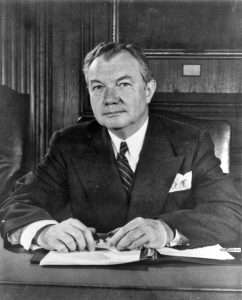The Volokh Conspiracy
Mostly law professors | Sometimes contrarian | Often libertarian | Always independent
Today in Supreme Court History: October 9, 1954
10/9/1954: Justice Robert H. Jackson dies.

Editor's Note: We invite comments and request that they be civil and on-topic. We do not moderate or assume any responsibility for comments, which are owned by the readers who post them. Comments do not represent the views of Reason.com or Reason Foundation. We reserve the right to delete any comment for any reason at any time. Comments may only be edited within 5 minutes of posting. Report abuses.
Please to post comments


Pilon v. Bordenkircher, 444 U.S. 1 (decided October 9, 1979): Court, relying on its own recent precedent, reverses the denial of habeas and remands back to District Court; state conviction for first degree manslaughter is not to be measured by "no evidence in support of conviction" (former standard) but by the stricter standard of "after viewing the evidence in the light most favorable to the prosecution, any rational trier of fact could have found the essential elements of the crime beyond a reasonable doubt"
Agoston v. Commonwealth of Pennsylvania, 340 U.S. 844 (decided October 9, 1950): denying cert in murder case; Frankfurter in support writes to emphasize that denying cert does not mean the Court is affirming the decision below; Douglas and Black dissent, pointing out that this case is similar to a recent case where the Court had overturned conviction on Due Process grounds (Turner v. Commonwealth of Pennsylvania, 338 U.S. 62) (in that pre-Miranda case, appearance before magistrate was delayed until confession had been obtained by police after "prolonged questioning")
Justice Jackson died at the home of his mistress. The court PR flack came up with a just-so story that he was on his way to Sears on Conn Ave at the MD/DC line.
Even by the standards of 1954 journalists saw through this and asked:
1. Why was he headed to Sears hours before it opened?
2. Why would he go to the Conn Ave Sears and not one closer to his home in Virginia?
3. Justice Jackson never once in his life shopped at Sears.
Justice Jackson was American. And Sears was where America shopped.